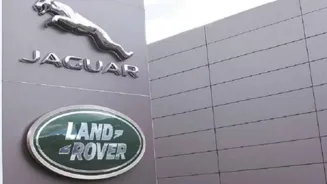Jaguar Land Rover (JLR) has faced major disruption in its production and sales after a cyber attack hit the company over the weekend. The British carmaker, owned by India’s Tata Motors, has shut down its IT
systems to reduce the impact of the incident.
The attack came just as the latest batch of new registration plates became available on September 1, one of the busiest times for vehicle deliveries.
JLR has assured customers that “at this stage there is no evidence any customer data has been stolen” and is working quickly to restart its systems in a controlled way. However, the shutdown has affected production at its main UK plants in Halewood and Solihull, where the Range Rover and Range Rover Sport are built.
Production and car deliveries were halted as a precaution during the cyber attack
According to the BBC, workers at Halewood were told not to come to work on September 2, though they are expected to return on September 3 “unless otherwise informed.”
Solihull staff were also sent home, and the attack is understood to have affected parts supplies and new car handovers, although JLR has not officially confirmed this.
The company’s retail operations have also been hit, with some dealers unable to register new cars on what is usually a busy “new plate” day. Despite these issues, JLR’s public-facing website, including its car configurator, remains fully operational.
Tata Motors confirmed the incident as a global IT security issue
JLR’s parent company, Tata Motors, posted a notice to the Indian stock exchange describing the matter as an “IT security incident” causing global disruption, the BBC states.
The National Crime Agency said it is aware of the incident and is working with partners to understand the impact. The attack comes in the wake of similar cyber incidents in the UK, including attacks on Marks & Spencer and the Co-op, which were linked to extortion attempts.
JLR had recently signed an £800m, five-year deal with Tata Consultancy Services (TCS) to improve cybersecurity and other IT services as part of its digital transformation efforts. The current halt in production adds pressure on the firm, which had recently reported a slump in profits due to rising costs from US tariffs.



















